PLEASE NOTE:
While the following article relates to your Google search, the services and methods at Goodwin Hypnosis may differ from those mentioned below. Since 2007, we have helped thousands of clients to overcome emotional and behavioral challenges when all else had failed. According to many of them (and their referring healthcare providers), our methods are faster than talk therapy, easier than willpower, and safer than medication. If you’re ready to resolve your issues, skip the article and visit the rest of our website, where you can learn about our unique approach, watch client testimonial videos, and discover how working with us one-on-one could be the solution you’ve been searching for.
We can help you with a variety of issues relating to emotional trauma. While we don't diagnose disorders like PTSD, we have helped hundreds of clients to overcome a wide range of traumatic experiences and their negative effects with methods that are more efficient and comfortable than CBT or EMDR. If you would like to learn more about working with us one-on-one to clear your trauma, click here.
Introduction
Relationships can be profoundly impacted when one partner is struggling with Complex PTSD. This condition, often stemming from prolonged trauma, can alter emotional and communicative dynamics, especially in marriages. Emotional regulation becomes a significant challenge, leading to anxiety, irritability, and mood swings that can create misunderstandings and conflicts.
Trust issues further complicate this, making open communication difficult and potentially leading to withdrawal and avoidance behaviors. While these challenges can feel overwhelming, understanding the dynamics of Complex PTSD and employing supportive strategies can pave the way for healing and strengthened connections. This article delves into the effects of Complex PTSD on relationships, explores common challenges in marriages, and provides effective communication techniques and resilience-building strategies to support affected couples.
How Complex PTSD Affects Relationships
Complex trauma profoundly affects connections, particularly in marriages, by changing emotional and communicative dynamics. Individuals suffering from this condition often experience challenges with emotional regulation, leading to pronounced anxiety, irritability, and mood swings. Such emotional fluctuations can create significant misunderstandings and conflicts between individuals, as one might feel overwhelmed by their significant other's intense reactions or frustrated by their emotional withdrawal.
One study emphasizes how companions of individuals with PTSD navigate a complex landscape of emotional highs and lows, constantly striving to make sense of the trauma while managing shifting identities and connections. This journey is marked by a continuous juxtaposition of losses and gains, further complicating the relationship dynamics.
Trust issues stemming from past traumas can exacerbate these challenges, leading to withdrawal and avoidance behaviors. This makes open communication difficult, as one or both partners may struggle to engage in honest dialogues. The importance of addressing these issues is underscored by findings that emphasize the need for enhanced clinician awareness and the potential benefits of couples-based therapies for PTSD.
Training in self-compassion has been found to be particularly beneficial in romantic partnerships. A study involving 209 heterosexual pairs revealed that men, in particular, benefit when their partners practice self-compassion. This practice can be developed and has been demonstrated to enhance overall connection wellness and satisfaction, emphasizing its potential as a valuable resource in couples’ therapy.
The statistics further underscore the need for targeted interventions. In a sample of 153 individuals, the average relationship duration was nearly eight years, yet many participants reported significant challenges in maintaining emotional and physical intimacy. These findings indicate that unresolved trauma can result in emotional disconnection, where individuals feel neglected or taken for granted, ultimately leading to a decline in intimacy and satisfaction.
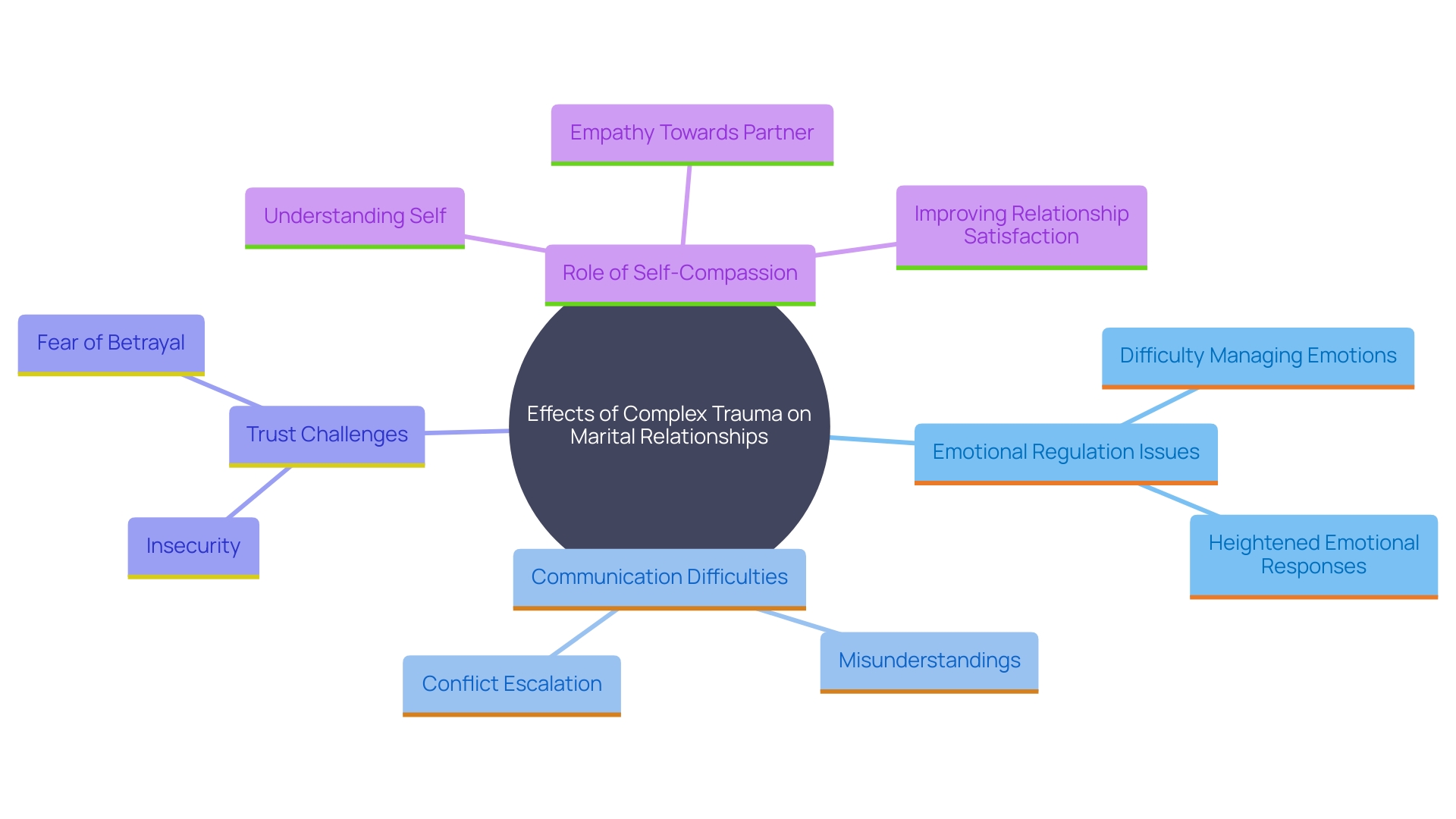
Common Challenges in Marriages with Complex PTSD
Marriages where one individual has Complex PTSD often encounter unique challenges. These may include difficulties in intimacy, where the affected individual may have a heightened sensitivity to physical touch or emotional closeness due to past trauma. Furthermore, individuals may encounter feelings of helplessness or frustration when trying to support their loved one, leading to resentment. It is common for the non-affected partner to feel isolated or uncertain about how to provide the necessary support, creating a rift in the bond.
One case study highlights the journey of a couple who spent 20 years perpetuating the dysfunction from their childhoods, leading to further damage in their connection. They eventually found healing through a support group at their church, illustrating the potential for recovery with the right resources. This highlights the significance of seeking specialized assistance and not giving up on the connection.
Statistics indicate that dysfunctional connections are associated with various adverse effects, such as a heightened risk of anxiety, mood, and substance use disorders. On the other hand, stable and healthy connections can serve as shields against the adverse impacts of life stressors, highlighting the significance of resolving interpersonal issues for overall well-being.
Quotes from experts like John Gottman emphasize how communication breakdowns and negative thoughts, such as feelings of helplessness and frustration, can undermine the foundation of a partnership. Comprehending these dynamics can assist partners in breaking free from harmful patterns and restoring their emotional bond.
Furthermore, studies show that partnership therapies, like Integrative Behavioral Couple Therapy (IBCT) and Emotionally Focused Therapy (EFT), can enhance 70%–80% of partnerships on average. These therapies aim at tackling detrimental thought processes, comprehending and articulating feelings, and improving behavioral involvement in the relationship, offering a route to recovery for couples facing Complex trauma.
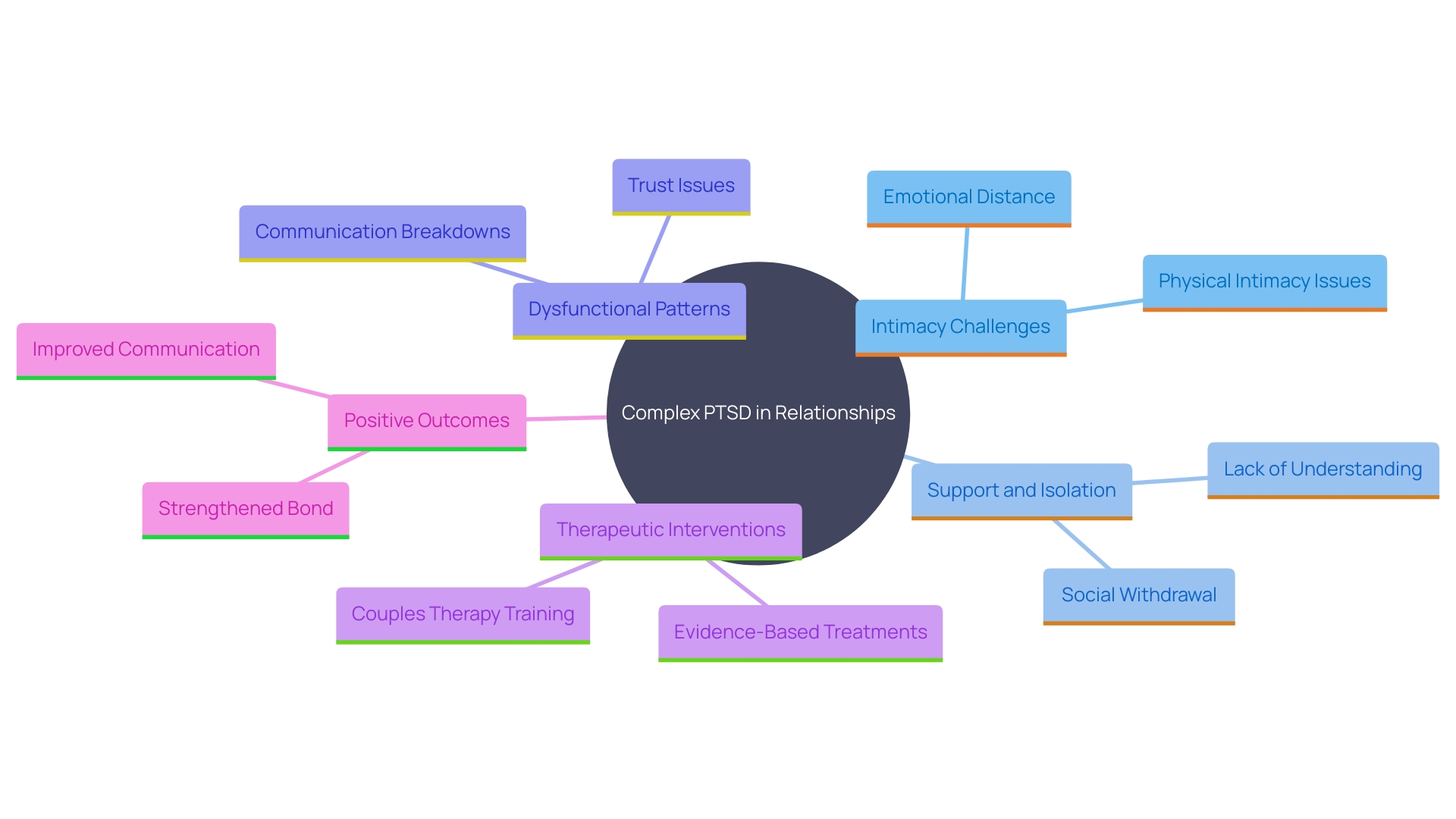
Impact of Complex PTSD on Intimacy and Trust
Intimacy and trust are foundational elements of a healthy marriage, but Complex trauma can severely impact both. Individuals with Complex post-traumatic stress often have a profound fear of vulnerability, which can make it challenging for them to fully engage in intimate moments. This fear is frequently rooted in past betrayals or abusive experiences, leading to an avoidance of closeness. According to research, betrayal trauma occurs when someone we trust deeply violates that trust, which can leave us emotionally wounded and vulnerable. 'This kind of trauma can arise from infidelity, deception, or emotional manipulation, and it affects the foundation of our connections where trust is intended to create a secure environment for vulnerability, honesty, and mutual respect.'. When trust is shattered, the emotional impact can be devastating, leading to chronic rumination about past and future events, which can exacerbate existing trauma and interfere with the quality of life.
Trust can be especially diminished as individuals with Complex PTSD may find it hard to have faith in the safety and dependability of their significant other, often leading to emotional distancing and conflict. Research has indicated that close personal violence is moderately linked to major depressive disorder and other mental health concerns, which can further complicate the dynamics of a connection. The struggle to make sense of the trauma, shifting identities, and relationships can evoke a range of different emotions, making it a continual journey of losses and gains for both partners.
However, there is hope for enhancing attachment security through relational processes such as sharing positive emotions, satisfying sexual experiences, and partnership therapy. Evidence-based modalities have been found to be extremely effective, with 70% of couples reporting positive effects from counseling. By addressing the underlying processes that facilitate or maintain certain outcomes, individuals and their partners can work towards healing and positive psychological growth. The journey of navigating Complex post-traumatic stress disorder in a relationship is undoubtedly challenging, but with the right support and understanding, it is possible to rebuild intimacy and trust.
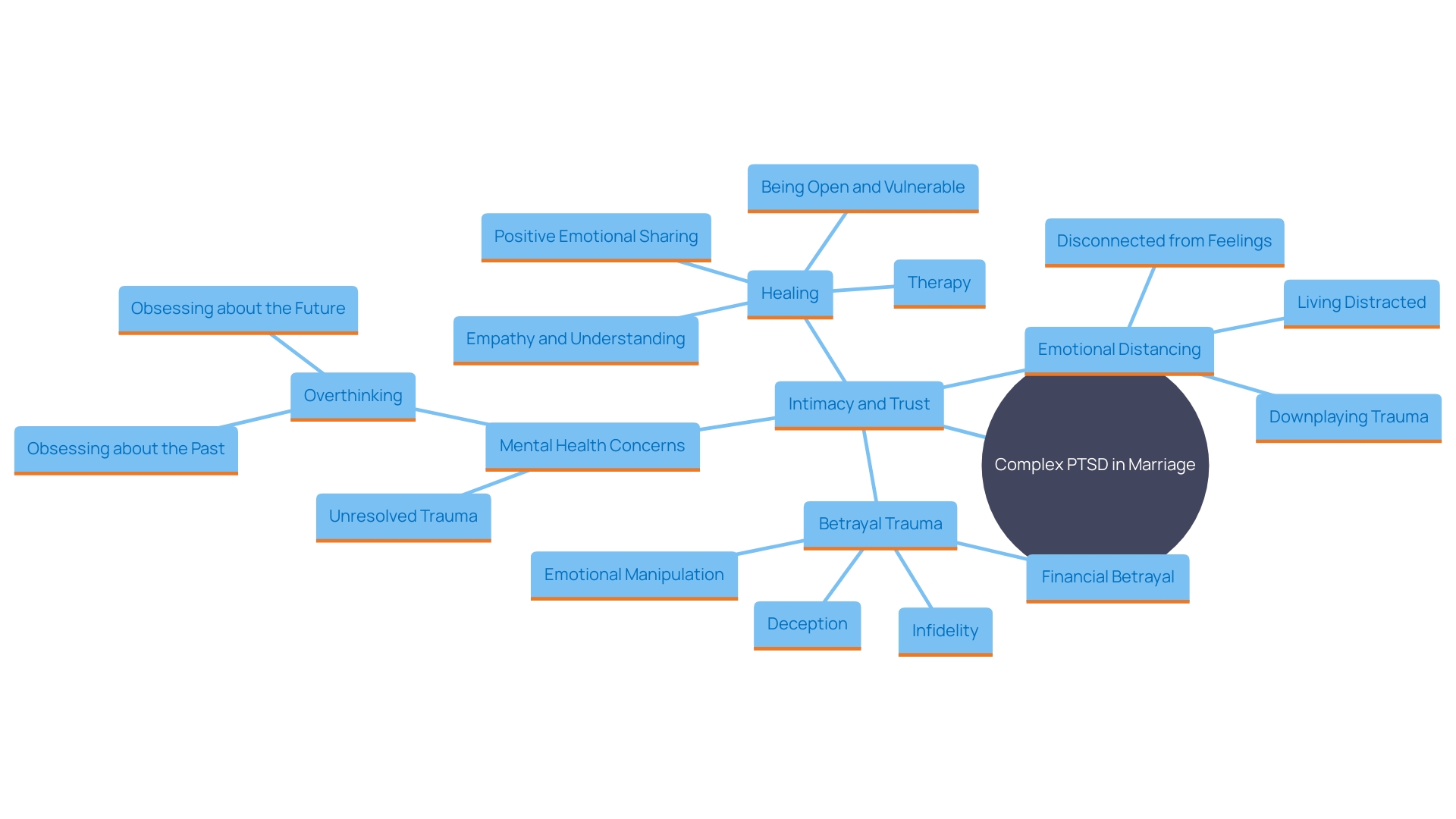
Effective Communication Techniques for Couples
Navigating the complexities of a marriage affected by Complex PTSD requires effective communication strategies. Couples can benefit immensely from using 'I' statements to express their feelings without placing blame. For instance, saying 'I feel anxious when you raise your voice' can help communicate emotions more clearly and reduce defensiveness. Active listening is another crucial element, where each individual makes a concerted effort to understand the other's perspective fully. An important aspect of this communication is setting aside dedicated time for discussions, creating a safe space for both partners to express their thoughts and feelings openly.
A 2024 study published in Personal Relationships highlighted that pausing to internally reflect on a conflict situation can significantly lower distress and boost self-efficacy—the confidence in one's ability to manage the conflict appropriately. This increased self-efficacy enhances connection satisfaction and promotes constructive behaviors during conflicts. The study suggests that many people already know which behaviors would benefit conflict resolution but need time to reflect on these tools.
Moreover, nurturing significant connections greatly affects an individual's mental and physical well-being. Stable and healthy close connections serve as buffers against the negative effects of life stressors, such as the development and severity of PTSD, depression, anxiety, and suicidality. On the other hand, dysfunctional connections are associated with adverse results, such as elevated rates of physical ailments and death, heightened risk of anxiety, mood, and substance use disorders, and intensified suicidal thoughts and despair.
In practice, this means that therapy for partners can play an essential role in assisting distressed pairs in identifying dysfunctional patterns, increasing understanding and empathy, communicating more effectively, and building connection. Integrative Behavioral Couple Therapy (IBCT), Emotionally Focused Couple Therapy (EFT), and Cognitive Behavioral Couple Therapy (CBCT) are some of the most empirically supported therapies that aim to help couples navigate these challenges and improve their relationships.
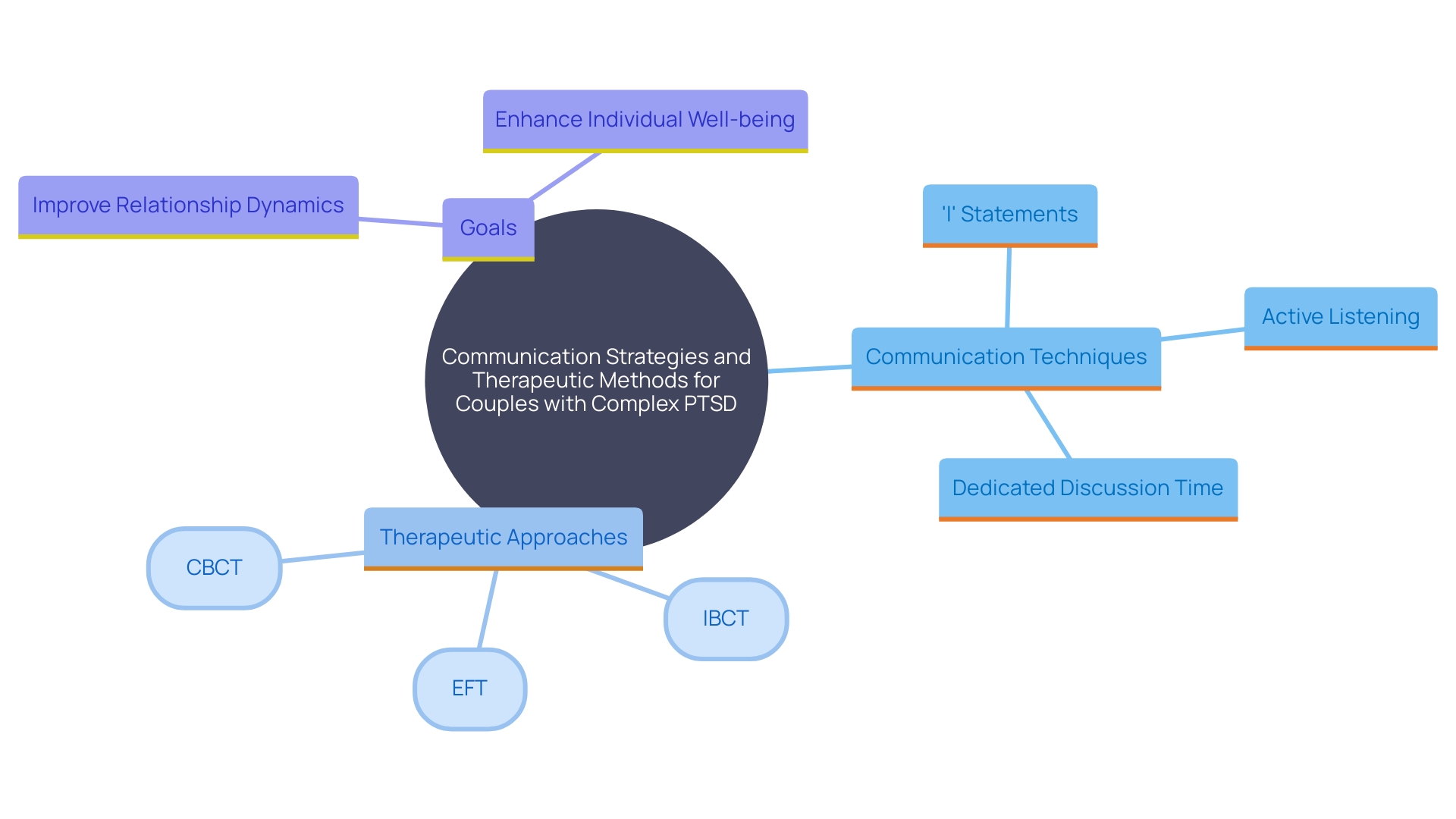
Supporting a Partner with Complex PTSD
Assisting an individual with Complex trauma involves navigating a path filled with both challenges and rewards. Understanding the condition is crucial. Complex post-traumatic stress disorder often arises from prolonged trauma and shows in a variety of behaviors and emotional reactions. Learning about these aspects can promote a deeper understanding of your significant other’s experiences and reactions.
A study highlighted that associates of individuals with PTSD experience a spectrum of emotions and challenges, often balancing between moments of loss and moments of gain. This continual journey can strain relationships but also offer opportunities for growth and connection.
Encouraging your significant other to seek professional help is vital. Access to appropriate care can be challenging, and experiences with professional support can vary widely. Some find significant relief through professional intervention, while others may experience additional stress or feelings of disconnection from the care process. Recent guidelines and research, such as those supported by the National Institute of Mental Health, highlight the significance of customized, cooperative care methods that have demonstrated encouraging outcomes in alleviating trauma-related symptoms.
Creating a supportive atmosphere at home is equally important. Simple gestures of kindness and reassurance can significantly reduce feelings of isolation. Acts of compassion help in promoting healing, making your significant other feel understood and valued. It’s also advantageous to investigate alternative treatments such as art, writing, or dance therapy, which can be especially effective in assisting individuals with trauma to build new life narratives and participate in creative coping strategies.
Overall, the journey of assisting someone with Complex trauma is intricate and necessitates a mix of patience, understanding, and active involvement in both professional and personal support networks. The experiences of others in similar situations reveal that while there may be struggles, there are also moments of profound connection and mutual growth.
Strategies for Building Resilience in Marriages Affected by Complex PTSD
Building resilience in marriages impacted by Complex PTSD involves fostering a strong support system and practicing self-care. Couples can engage in joint activities that promote bonding, such as mindfulness exercises or shared hobbies, which can enhance emotional connection. Creating regular meetings to talk about emotions and difficulties can assist both individuals in feeling acknowledged and appreciated. Moreover, pursuing therapy for partners can create a secure environment for both individuals to tackle their concerns together, enhancing their bond over time. Evidence-based approaches are extremely effective in treating partners, with 70% reporting positive effects from counseling. Research indicates that people with robust social connections are more prone to heal from trauma and stress, highlighting the significance of supportive bonds. Additionally, training in self-compassion can be a valuable tool in couples' therapy, as it enhances the health and satisfaction of the partnership. Research has indicated that self-compassionate partners contribute to happier and more resilient connections, making it a crucial component of therapy. The benefits of these approaches extend beyond the relationship, as participants in programs like the Illinois Strong Couples project have reported improved mental health, better sleep, and decreased problematic behaviors.
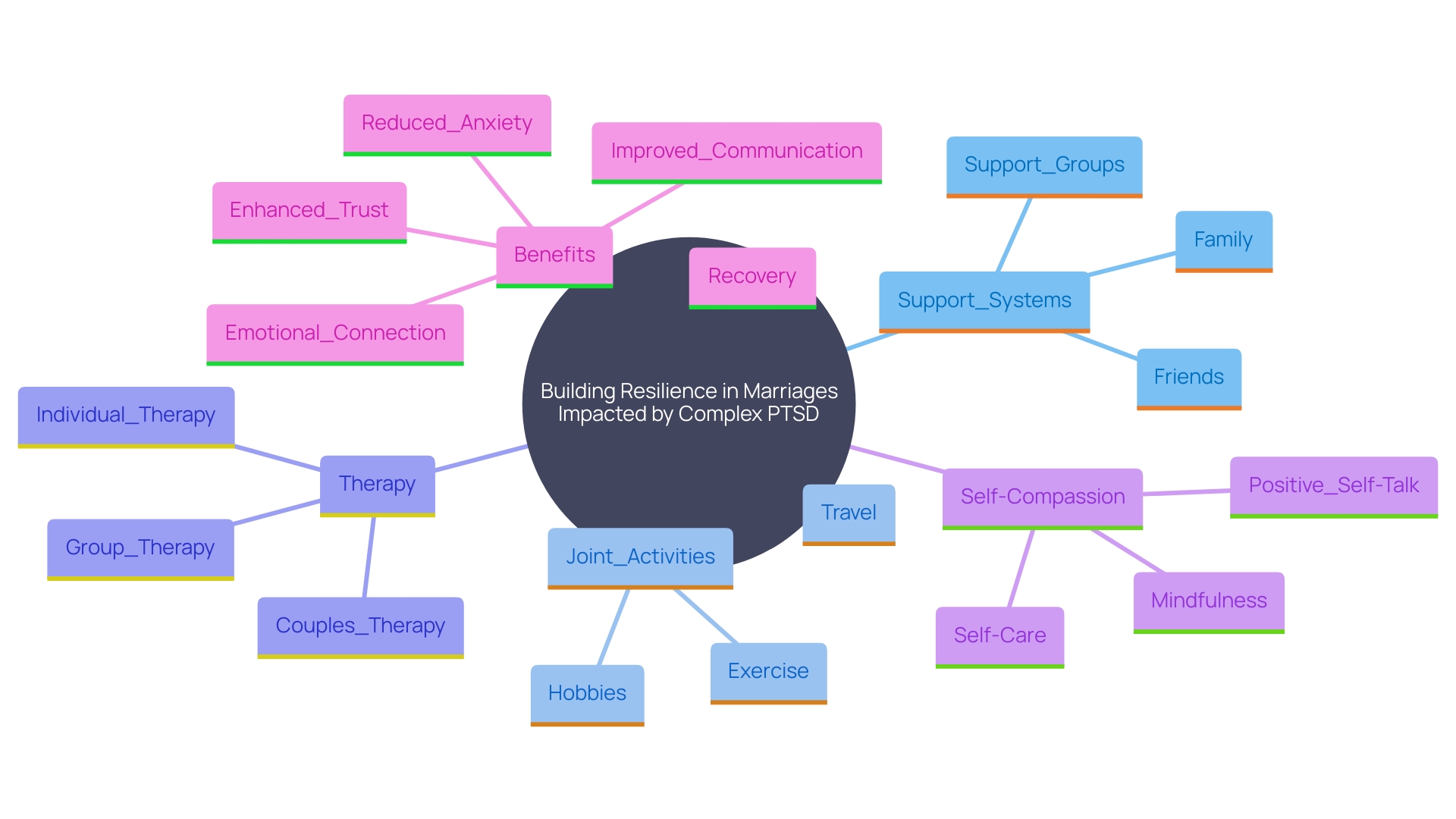
Conclusion
Navigating the complexities of relationships affected by Complex PTSD presents significant challenges but also offers pathways to healing and connection. The emotional fluctuations and trust issues associated with this condition can lead to misunderstandings and conflict, impacting intimacy and communication. Understanding these dynamics is crucial for couples seeking to strengthen their bond and support one another through the difficulties that arise.
Effective communication techniques, such as using 'I' statements and active listening, can foster a safe environment for expressing feelings and needs. By prioritizing open dialogue and reflecting on conflict situations, couples can enhance their relationship satisfaction and build resilience. Engaging in couples therapy can further provide the tools necessary to address dysfunctional patterns and promote emotional engagement, leading to healthier interactions.
Supporting a partner with Complex PTSD requires patience and a commitment to understanding their experiences. Encouraging professional help, creating a nurturing home environment, and exploring alternative therapeutic avenues can significantly aid in the healing process. The journey may be filled with challenges, but it can also lead to profound growth and connection when approached with compassion and care.
Ultimately, the path toward rebuilding intimacy and trust in relationships impacted by Complex PTSD is not only about addressing the hurdles but also about celebrating the moments of connection and resilience. With the right strategies and support, couples can navigate these challenges together, fostering a deeper understanding and a more fulfilling partnership.




